希腊文化--欧洲文化史复习资料
- 格式:doc
- 大小:82.50 KB
- 文档页数:6
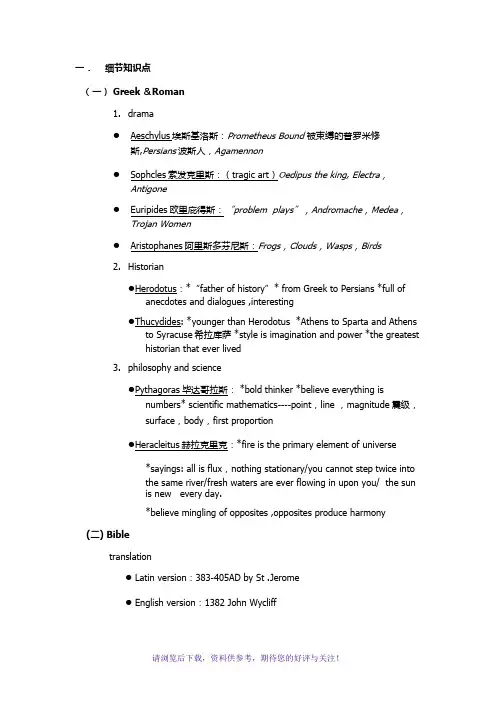
一.细节知识点(一)Greek &Roman1.drama●Aeschylus埃斯基洛斯:Prometheus Bound被束缚的普罗米修斯,Persians波斯人,Agamennon●Sophcles索发克里斯:(tragic art)Oedipus the king, Electra,Antigone●Euripides欧里庇得斯:“problem plays”,Andromache,Medea,Trojan Women●Aristophanes阿里斯多芬尼斯:Frogs,Clouds,Wasps,Birds2.Historian●H erodotus:*“father of history”* from Greek to Persians *full ofanecdotes and dialogues ,interesting●T hucydides: *younger than Herodotus *Athens to Sparta and Athensto Syracuse希拉库萨 *style is imagination and power *the greatesthistorian that ever lived3.philosophy and science●P ythagoras毕达哥拉斯: *bold thinker *believe everything isnumbers* scientific mathematics----point,line ,magnitude震级,surface,body,first proportion●H eracleitus赫拉克里克:*fire is the primary element of universe*sayings: all is flux,nothing stationary/you cannot step twice intothe same river/fresh waters are ever flowing in upon you/ the sunis new every day.*believe mingling of opposites ,opposites produce harmony(二) Bibletranslation●Latin version:383-405AD by St .Jerome●English version:1382 John Wycliff(三)Middle ages/ Medieval1. AD 476 Roman power was gone2. after 1054 Church was divided into Roman Catholic and Eastern OrthodoxChurch3.The Crusades: 1096-1291 last for about 200 years4.learning:● Charlemagne查理曼大帝:*western and central Europe*father of Europe .Emperor of Romans in 800*Carolingian Renaissance加洛林*encourage Christian religion and ancient learning by setting monasteryschools● Alfred the Great阿尔弗雷德大帝:*ruler of Anglo Saxon of Wessex*Encourage teacher and scholars , Wessex center of learning*Anglo Saxon chronicles英国编年史● St .Thomas Aquinas*Italian philosopher ,scholasticism经院哲学*Summa Contra Centiles , Summa Theologiae 《神学大全》*building a society of “God’s rule””God’s will”,Pope is“Christ’splenipotentiary基督的全权代表” above secular rulers● Roger Bacon罗杰培根*a British monk ,one of the earliest advocates of experimental scientificresearch and observation*works :Opus maius ,encyclopedia of the sciences of his time5.Literature●Beowulf :an Anglo Saxon epic● Song of Roland ,La Chanson de Gestes: French● Dante:the divine of comedy神曲 greatest poet of Italy●Geoffrey Chaucer 乔叟:English poet :canterbury tales坎特伯雷故事集,(first short story teller, first modern poet in English literature )(四)Renaissance1.started in Florence and Venice, Italy2.heart of Renaissance philosophy is greatness of man ,humanism3.masterpieces :● Giovanni Boccaccio薄伽丘:Decameron十日谈(the greatest achievementof prose fiction 散文小说in the middle ages)● Francesco Petrarch彼德拉克:*discover Cicero’s Oration Oro Arochia,a Roman defense of poetry*Works: Canzoniers(lyrical), Africa,Metrical Epistles,On Contempt forthe Worldly Life,On Solitude,Ecologues, The Letters●Giotto乔托:*forerunner of Renaissance,led the way to humanism,realistic depiction of space*works: Flight into Egypt ,Betrayal of Juda s●Giorgione乔尔乔捏:Tempesta , Sleeping Venus(use of colour schemes to unify picture and most revolutionaryresult in this sphere)●Leonardo da Vinci:*painter, sculptor, architect, musician, mathematician, engineer, inventor,anatomist, geologist, cartographer, botanist, and writer.*12 paintings 5000 books ,Renaissance man in the true sense of word.*Last Supper(most famous religious pictures), Mona Lisa(most portrait)●Michelangelo Buonarroti:* an Italian sculptor, painter, architect, poet, and engineer* David ,Sistine Chapel ,Dying Slave ,Moses●Raphael:Madonna(Virgin Mary)各种圣母画,school of Athens● Rabelais拉伯雷: French ,Gargantua and Pantagruel《巨人传》● Pleiade 七星诗社:French ,leader is Pirre de Ronsard(Sonnet PourHelene) ,发扬保卫法兰西语言●Cervantes塞万提斯:Spanish,Don Quixote 1062● Erasmus:Dutch, Renaissance humanist, Catholic priest, teacher, andtheologian,Greek edition of New Testament ,Praise of Folly《愚人颂》●Durer : German ,follower of Martin Lutherthe four horsemen of apocalypse 天启四骑士knight ,death and the devil●Thomas more:英国人,Utopia乌托邦,conclusion●Shakespeare:英国人Twelfth night ,As you like it ,Hamlet,Othello,King Lear ,Macbeth,Antony and Cleopatra,Sonnets, King Henry 5,6二 .名词解释1.RenaissanceRenaissance is a period of western civilization between 14-17th century.The word Renaissance means revival .it also means the revival of interestin ancient Greek and Roman culture,which started in Florence andVenice ,Italy . the heart of~is humanism.2 . Reformation~ was a 16th century religious movement as well as a socio-political movement ,which began with Martin Luther’s 95 theses in 1517. TheReformation began as an attempt to reform the Roman Catholic Church.3.Middle ages :~is also called Medieval ,”the year of faith”* or the thousand-year period following the fall of the western roman empire in the 5th century .it camebetween ancient times and modern times .During this period Germanickingdom grew into nations such as England ,French ,Spain, Italy, Germany.4 . Feudalism~is a system of holding land in exchange for military service .the word~was derived from the Latin “feudum” , a grant of land.5 Catholic~Means” universal”. ~church was a highly centralized and disciplinedinternational religious organization .in the middle ages ,almost everyEuropeans belonged to it.6. old testament~is one of the two parts of the Bible ,which is about the God and the laws of God. Testament means agreement—the agreement between God and man.7. Pentateuch 摩西五书The oldest first five parts of the Bible including Genesis ,Exodus,Leviticus, Numbers, Deuteronomy8. doric :one of Greek architecture styles,~is also called masculine style .it’s sturdy 坚定的,powerful,severelooking ,showing sense of proportions andnumbers.Ionic:feminine style graceful and elegant,showing wealth of ornament装饰三.问答1. What happened in Western Europe after the decline of the Roman Empire?After the Roman Empire lost its predominance优势, a great many Germanic Kingdoms began to grow into the nations know as England, France, Italy, andGermany in its place. These nations of Western Europe were in the scene of frequent wars and invasions. The political unity had given way to widespread destruction and confusion. Hunger and disease killed many lives and village fell into ruin and great areas of land lay waste. There was no central government to keep the order. The only organization that seemed to unite Europe was the Christian church. Christianity was almost the all and the one of Medieval lives in western Europe and took lead in politics, law, art, and learning for hundreds years.2. What were the cultural characteristics of the period from 500 to 1000? Above all, the cultural characters of this period were the heritage and achievement of Roman culture and the emergence of Hebrew and Gothic culture.3.What made Italy the birthplace of the Renaissance?Because of its geographical position, foreign trade developed early in Italy. This brought Italy into contact with other cultures and gave rise to urban economy and helped Italy accumulate wealth which was an essential factor for the flowering of art and literature.For two centuries beginning from the late 15th century, Florence was the golden city which gave birth to a whole generation of poets, scholars, artists and sculptors. There was in Florence a revival of interest in classical learning and rising of humanist ideas.And to spread the new ideas, libraries and academies were founded.In the 15th century printing was invented and helped to spread humanist ideas.4. How did Italian Renaissance art and architecture break away from medi eval traditions?The Italian Renaissance art and architecture radically broke away from the medieval methods of representing the visible world. Compared with the latter, the former has t he following distinct features:⑴Art broke away from the domination of church and artist who used to be craftsmen commissioned by the church became a separate strata doing noble and creati ve work⑵Themes of painting and architecture changed from purely celestial realm focusingon the stories of the Bible, of God and Mary to an appreciation of all aspects of n ature and man;⑶The artists studied the ruins of Roman and Greek temples and put many of the principles of ancient civilization into their works;⑷Artists introduced in their works scientific theories of anatomy and perspective.。
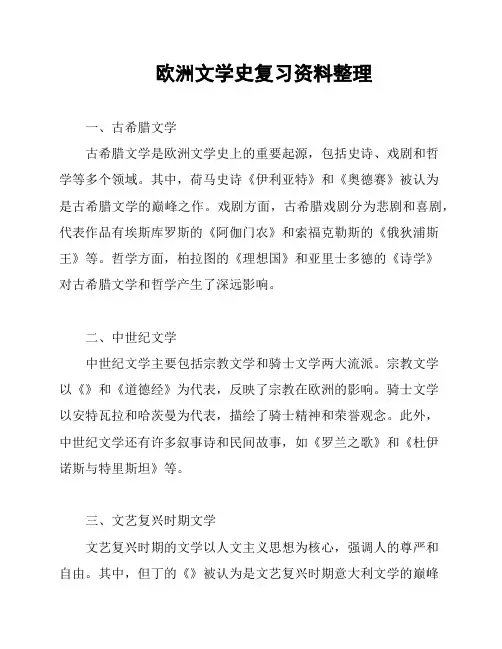
欧洲文学史复习资料整理一、古希腊文学古希腊文学是欧洲文学史上的重要起源,包括史诗、戏剧和哲学等多个领域。
其中,荷马史诗《伊利亚特》和《奥德赛》被认为是古希腊文学的巅峰之作。
戏剧方面,古希腊戏剧分为悲剧和喜剧,代表作品有埃斯库罗斯的《阿伽门农》和索福克勒斯的《俄狄浦斯王》等。
哲学方面,柏拉图的《理想国》和亚里士多德的《诗学》对古希腊文学和哲学产生了深远影响。
二、中世纪文学中世纪文学主要包括宗教文学和骑士文学两大流派。
宗教文学以《》和《道德经》为代表,反映了宗教在欧洲的影响。
骑士文学以安特瓦拉和哈茨曼为代表,描绘了骑士精神和荣誉观念。
此外,中世纪文学还有许多叙事诗和民间故事,如《罗兰之歌》和《杜伊诺斯与特里斯坦》等。
三、文艺复兴时期文学文艺复兴时期的文学以人文主义思想为核心,强调人的尊严和自由。
其中,但丁的《》被认为是文艺复兴时期意大利文学的巅峰之作。
在英国,莎士比亚的戏剧作品为文艺复兴时期文学增添了光彩。
法国方面,拉伯雷的《加尔庞尼修道院的历史》被视为法国文学的里程碑。
四、启蒙时代文学启蒙时代文学强调理性和思想解放,代表作品包括伏尔泰的《哲学字典》和卢梭的《社会契约论》。
在英国,斯威夫特的《格列佛游记》揭示了社会问题,庇隆的《西方》探讨了宗教。
五、浪漫主义文学浪漫主义文学追求个人情感和幻想,代表作品有雨果的《悲惨世界》和拜伦的《唐璜》。
在德国,诗人歌德的作品《浮士德》被视为浪漫主义文学的代表之一。
六、现代主义文学现代主义文学突破传统形式,追求新的表达方式。
在法国,普鲁斯特的《追忆逝水年华》和卡夫卡的《变形记》开创了现代主义文学的新纪元。
在美国,福克纳的作品展现了南方文化的复杂性。
七、当代文学当代文学多样化且充满创新,代表作品有奥尔罕·帕慕克的《我的名字叫红》和科布斯的《百年孤独》。
同时,中国作家莫言的《红高粱家族》和日本作家村上春树的《挪威的森林》也在国际上获得了广泛认可。
以上是欧洲文学史的简要复习资料,希望对您的复习有所帮助。

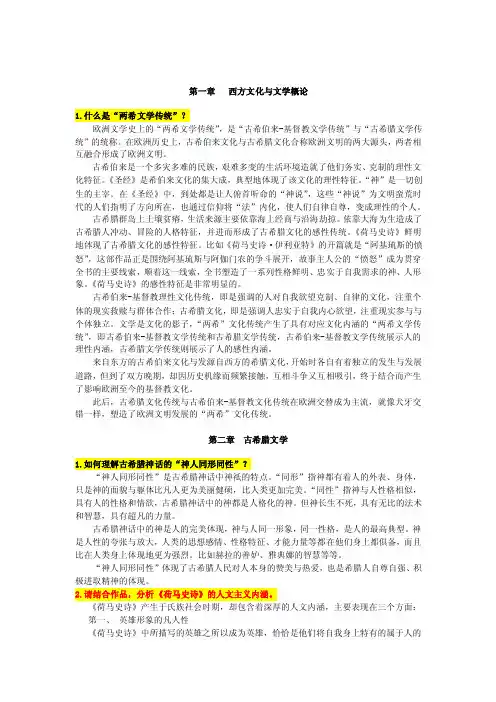
第一章西方文化与文学概论1.什么是“两希文学传统”?欧洲文学史上的“两希文学传统”,是“古希伯来-基督教文学传统”与“古希腊文学传统”的统称。
在欧洲历史上,古希伯来文化与古希腊文化合称欧洲文明的两大源头,两者相互融合形成了欧洲文明。
古希伯来是一个多灾多难的民族,艰难多变的生活环境造就了他们务实、克制的理性文化特征。
《圣经》是希伯来文化的集大成,典型地体现了该文化的理性特征。
“神”是一切创生的主宰。
在《圣经》中,到处都是让人俯首听命的“神说”,这些“神说”为文明蛮荒时代的人们指明了方向所在,也通过信仰将“法”内化,使人们自律自尊,变成理性的个人。
古希腊群岛上土壤贫瘠,生活来源主要依靠海上经商与沿海劫掠。
依靠大海为生造成了古希腊人冲动、冒险的人格特征,并进而形成了古希腊文化的感性传统。
《荷马史诗》鲜明地体现了古希腊文化的感性特征。
比如《荷马史诗·伊利亚特》的开篇就是“阿基琉斯的愤怒”,这部作品正是围绕阿基琉斯与阿伽门农的争斗展开,故事主人公的“愤怒”成为贯穿全书的主要线索,顺着这一线索,全书塑造了一系列性格鲜明、忠实于自我需求的神、人形象。
《荷马史诗》的感性特征是非常明显的。
古希伯来-基督教理性文化传统,即是强调的人对自我欲望克制、自律的文化,注重个体的现实救赎与群体合作;古希腊文化,即是强调人忠实于自我内心欲望,注重现实参与与个体独立。
文学是文化的影子,“两希”文化传统产生了具有对应文化内涵的“两希文学传统”,即古希伯来-基督教文学传统和古希腊文学传统,古希伯来-基督教文学传统展示人的理性内涵,古希腊文学传统则展示了人的感性内涵。
来自东方的古希伯来文化与发源自西方的希腊文化,开始时各自有着独立的发生与发展道路,但到了双方晚期,却因历史机缘而频繁接触,互相斗争又互相吸引,终于结合而产生了影响欧洲至今的基督教文化。
此后,古希腊文化传统与古希伯来-基督教文化传统在欧洲交替成为主流,就像犬牙交错一样,塑造了欧洲文明发展的“两希”文化传统。
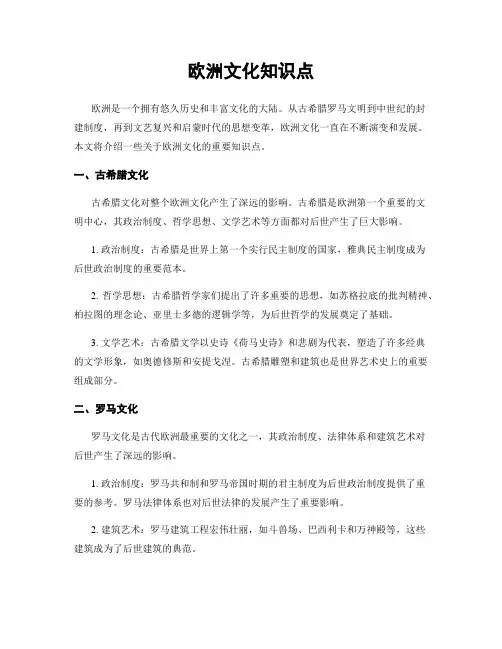
欧洲文化知识点欧洲是一个拥有悠久历史和丰富文化的大陆。
从古希腊罗马文明到中世纪的封建制度,再到文艺复兴和启蒙时代的思想变革,欧洲文化一直在不断演变和发展。
本文将介绍一些关于欧洲文化的重要知识点。
一、古希腊文化古希腊文化对整个欧洲文化产生了深远的影响。
古希腊是欧洲第一个重要的文明中心,其政治制度、哲学思想、文学艺术等方面都对后世产生了巨大影响。
1. 政治制度:古希腊是世界上第一个实行民主制度的国家,雅典民主制度成为后世政治制度的重要范本。
2. 哲学思想:古希腊哲学家们提出了许多重要的思想,如苏格拉底的批判精神、柏拉图的理念论、亚里士多德的逻辑学等,为后世哲学的发展奠定了基础。
3. 文学艺术:古希腊文学以史诗《荷马史诗》和悲剧为代表,塑造了许多经典的文学形象,如奥德修斯和安提戈涅。
古希腊雕塑和建筑也是世界艺术史上的重要组成部分。
二、罗马文化罗马文化是古代欧洲最重要的文化之一,其政治制度、法律体系和建筑艺术对后世产生了深远的影响。
1. 政治制度:罗马共和制和罗马帝国时期的君主制度为后世政治制度提供了重要的参考。
罗马法律体系也对后世法律的发展产生了重要影响。
2. 建筑艺术:罗马建筑工程宏伟壮丽,如斗兽场、巴西利卡和万神殿等,这些建筑成为了后世建筑的典范。
3. 文学艺术:罗马文学以维吾尔的《埃涅阿斯纪》和西塞罗的演讲文集为代表,对后世文学产生了重要影响。
罗马雕塑和壁画也是其文化的重要组成部分。
三、中世纪文化中世纪是欧洲历史上一个重要的时期,封建制度和基督教信仰在这个时期占据主导地位,对欧洲文化产生了深远影响。
1. 封建制度:中世纪欧洲的封建制度是一种农奴制度,贵族统治下的农民没有自由权利。
封建制度的特点是等级森严、权力分散。
2. 基督教文化:中世纪欧洲的文化基本上是基督教文化,教会在政治、社会和文化领域都具有重要影响力。
教会的建筑艺术和宗教画是中世纪文化的重要组成部分。
3. 文学艺术:中世纪文学以骑士文学和宗教文学为主,如《亚瑟王传奇》和《圣经》等。
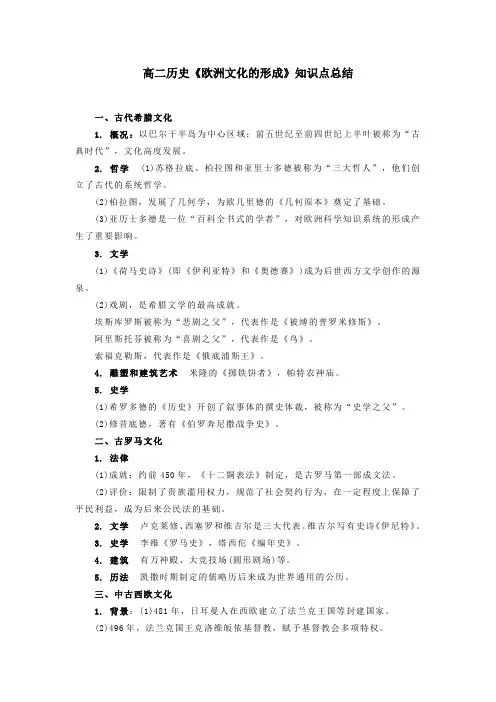
高二历史《欧洲文化的形成》知识点总结一、古代希腊文化1. 概况:以巴尔干半岛为中心区域;前五世纪至前四世纪上半叶被称为“古典时代”,文化高度发展。
2. 哲学(1)苏格拉底、柏拉图和亚里士多德被称为“三大哲人”,他们创立了古代的系统哲学。
(2)柏拉图,发展了几何学,为欧几里德的《几何原本》奠定了基础。
(3)亚历士多德是一位“百科全书式的学者”,对欧洲科学知识系统的形成产生了重要影响。
3. 文学(1)《荷马史诗》(即《伊利亚特》和《奥德赛》)成为后世西方文学创作的源泉。
(2)戏剧,是希腊文学的最高成就。
埃斯库罗斯被称为“悲剧之父”,代表作是《被缚的普罗米修斯》。
阿里斯托芬被称为“喜剧之父”,代表作是《鸟》。
索福克勒斯,代表作是《俄底浦斯王》。
4. 雕塑和建筑艺术米隆的《掷铁饼者》,帕特农神庙。
5. 史学(1)希罗多德的《历史》开创了叙事体的撰史体裁,被称为“史学之父”。
(2)修昔底德,著有《伯罗奔尼撒战争史》。
二、古罗马文化1. 法侓(1)成就:约前450年,《十二铜表法》制定,是古罗马第一部成文法。
(2)评价:限制了贵族滥用权力,规范了社会契约行为,在一定程度上保障了平民利益,成为后来公民法的基础。
2. 文学卢克莱修、西塞罗和维吉尔是三大代表。
维吉尔写有史诗《伊尼特》。
3. 史学李维《罗马史》,塔西佗《编年史》。
4. 建筑有万神殿、大竞技场(圆形剧场)等。
5. 历法凯撒时期制定的儒略历后来成为世界通用的公历。
三、中古西欧文化1. 背景:(1)481年,日耳曼人在西欧建立了法兰克王国等封建国家。
(2)496年,法兰克国王克洛维皈依基督教,赋予基督教会多项特权。
(3)756年,国王丕平把罗马周围地区交给教皇统治,“教皇国”建立。
(4)欧洲逐渐形成了王权与教权并立的二元政治格局。
2. 特点:基督教信仰成为西欧的文化符号,基督教会控制着西欧社会的精神生活。
3. 影响:(1)对西欧的文学艺术有重要影响。
如宗教神话、骑士文学和市民文学。
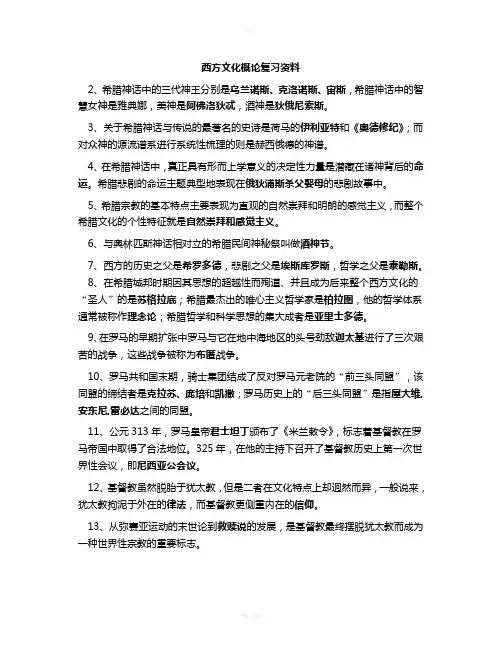
西方文化概论复习资料2、希腊神话中的三代神王分别是乌兰诺斯、克洛诺斯、宙斯,希腊神话中的智慧女神是雅典娜,美神是阿佛洛狄忒,酒神是狄俄尼索斯。
3、关于希腊神话与传说的最著名的史诗是荷马的伊利亚特和《奥德修纪》;而对众神的源流谱系进行系统性梳理的则是赫西俄德的神谱。
4、在希腊神话中,真正具有形而上学意义的决定性力量是潜藏在诸神背后的命运。
希腊悲剧的命运主题典型地表现在俄狄浦斯杀父娶母的悲剧故事中。
5、希腊宗教的基本特点主要表现为直观的自然崇拜和明朗的感觉主义,而整个希腊文化的个性特征就是自然崇拜和感觉主义。
6、与奥林匹斯神话相对立的希腊民间神秘祭叫做酒神节。
7、西方的历史之父是希罗多德,悲剧之父是埃斯库罗斯,哲学之父是泰勒斯。
8、在希腊城邦时期因其思想的超越性而殉道、并且成为后来整个西方文化的“圣人”的是苏格拉底;希腊最杰出的唯心主义哲学家是柏拉图,他的哲学体系通常被称作理念论;希腊哲学和科学思想的集大成者是亚里士多德。
9、在罗马的早期扩张中罗马与它在地中海地区的头号劲敌迦太基进行了三次艰苦的战争,这些战争被称为布匿战争。
10、罗马共和国末期,骑士集团结成了反对罗马元老院的“前三头同盟”,该同盟的缔结者是克拉苏、庞培和凯撒;罗马历史上的“后三头同盟”是指屋大维,安东尼,雷必达之间的同盟。
11、公元313年,罗马皇帝君士坦丁颁布了《米兰敕令》,标志着基督教在罗马帝国中取得了合法地位。
325年,在他的主持下召开了基督教历史上第一次世界性会议,即尼西亚公会议。
12、基督教虽然脱胎于犹太教,但是二者在文化特点上却迥然而异,一般说来,犹太教拘泥于外在的律法,而基督教更侧重内在的信仰。
13、从弥赛亚运动的末世论到救赎说的发展,是基督教最终摆脱犹太教而成为一种世界性宗教的重要标志。
14、《圣经》中的“旧约”是指梅瑟在西乃山上代表全体犹太人与上帝所订立的和约;“新约”则是指耶稣在十字架上代表全人类与上帝所订立的和约。
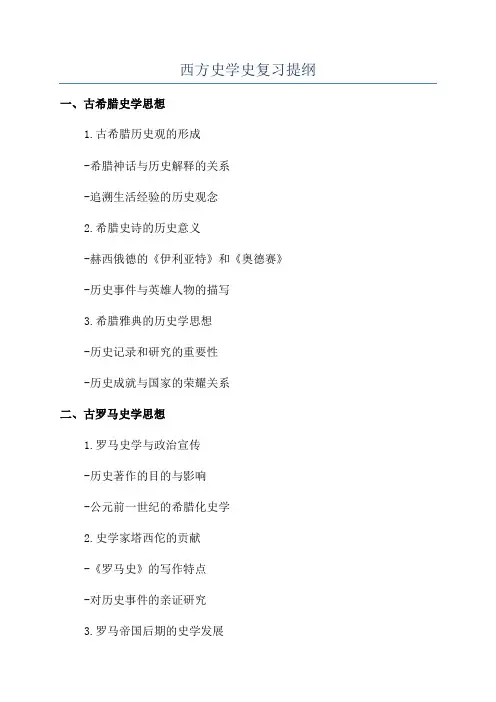
西方史学史复习提纲一、古希腊史学思想1.古希腊历史观的形成-希腊神话与历史解释的关系-追溯生活经验的历史观念2.希腊史诗的历史意义-赫西俄德的《伊利亚特》和《奥德赛》-历史事件与英雄人物的描写3.希腊雅典的历史学思想-历史记录和研究的重要性-历史成就与国家的荣耀关系二、古罗马史学思想1.罗马史学与政治宣传-历史著作的目的与影响-公元前一世纪的希腊化史学2.史学家塔西佗的贡献-《罗马史》的写作特点-对历史事件的亲证研究3.罗马帝国后期的史学发展-克劳狄乌斯·托勒密的地理学与历史学结合-安庞尼奥斯·玛尔切利努斯的《罗马史》三、中世纪欧洲的史学思想1.基督教史观的兴起-上帝的旨意与历史的走向-省察历史以反思罪孽2.利用宗教文献的史学研究-藏书馆与修道院的角色-文献解读与历史还原3.纪传体史书的兴起与影响-即时史的记录与意义-地区史志的编纂与传承四、文艺复兴时期的史学思想1.文艺复兴对史学的影响-古代文献的重新发现与研究-人文主义与历史观的变革2.历史文献的批判性分析-文献校勘与历史真实性的追求-司考学派与历史文献的分类3.史学方法的探索与-探索史学的本源与性质-赫拉多特斯和维奥利的历史观五、启蒙运动时期的史学思想1.启蒙运动对史学的影响-牛顿式的客观分析与历史研究-新资料的引入与历史写作的变革2.史学的理性分析与反思-思辨史学与批判史学的对立-史学方法的与历史记述的规范3.旅行学者与考古学的崛起-对古代文物的考古学研究-旅行游记与对古代遗产的发现六、近代史学发展的成果与争议1.正史与反史的辩论-传统历史写作与史学理论的反思-对历史真实性的追求与批判2.社会史与文化史的兴起-对社会结构与文化变迁的探索-社会史与文化史的历史观点与方法3.历史学科的专业化与多元化-美国历史学派与新史学的兴起-马克思主义历史学的发展与影响此为西方史学史复习提纲,可根据自身需要进行删减和调整,确保对各个阶段的史学思想有全面把握。
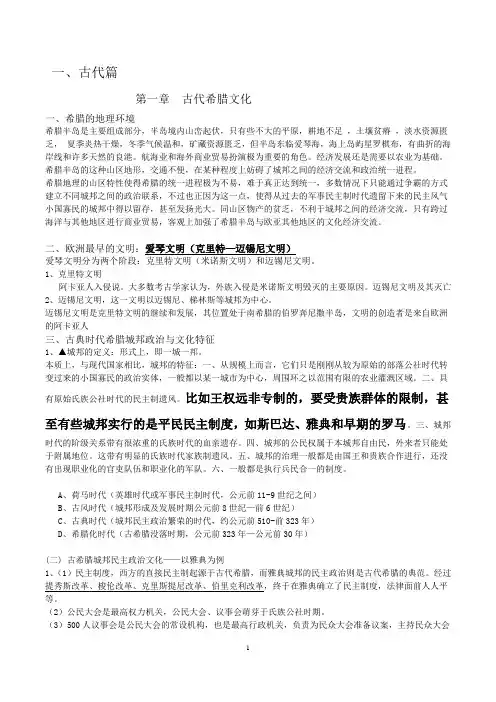
一、古代篇第一章古代希腊文化一、希腊的地理环境希腊半岛是主要组成部分,半岛境内山峦起伏,只有些不大的平原,耕地不足,土壤贫瘠,淡水资源匮乏,夏季炎热干燥,冬季气候温和,矿藏资源匮乏,但半岛东临爱琴海,海上岛屿星罗棋布,有曲折的海岸线和许多天然的良港。
航海业和海外商业贸易扮演极为重要的角色。
经济发展还是需要以农业为基础。
希腊半岛的这种山区地形,交通不便,在某种程度上妨碍了城邦之间的经济交流和政治统一进程。
希腊地理的山区特性使得希腊的统一进程极为不易,难于真正达到统一,多数情况下只能通过争霸的方式建立不同城邦之间的政治联系,不过也正因为这一点,使得从过去的军事民主制时代遗留下来的民主风气小国寡民的城邦中得以留存,甚至发扬光大。
同山区物产的贫乏,不利于城邦之间的经济交流,只有跨过海洋与其他地区进行商业贸易,客观上加强了希腊半岛与欧亚其他地区的文化经济交流。
二、欧洲最早的文明:爱琴文明(克里特—迈锡尼文明)爱琴文明分为两个阶段:克里特文明(米诺斯文明)和迈锡尼文明。
1、克里特文明阿卡亚人入侵说。
大多数考古学家认为,外族入侵是米诺斯文明毁灭的主要原因。
迈锡尼文明及其灭亡2、迈锡尼文明,这一文明以迈锡尼、梯林斯等城邦为中心。
迈锡尼文明是克里特文明的继续和发展,其位置处于南希腊的伯罗奔尼撒半岛,文明的创造者是来自欧洲的阿卡亚人三、古典时代希腊城邦政治与文化特征1、▲城邦的定义:形式上,即一城一邦。
本质上,与现代国家相比,城邦的特征:一、从规模上而言,它们只是刚刚从较为原始的部落公社时代转变过来的小国寡民的政治实体,一般都以某一城市为中心,周围环之以范围有限的农业灌溉区域。
二、具有原始氏族公社时代的民主制遗风。
比如王权远非专制的,要受贵族群体的限制,甚至有些城邦实行的是平民民主制度,如斯巴达、雅典和早期的罗马。
三、城邦时代的阶级关系带有很浓重的氏族时代的血亲遗存。
四、城邦的公民权属于本城邦自由民,外来者只能处于附属地位。
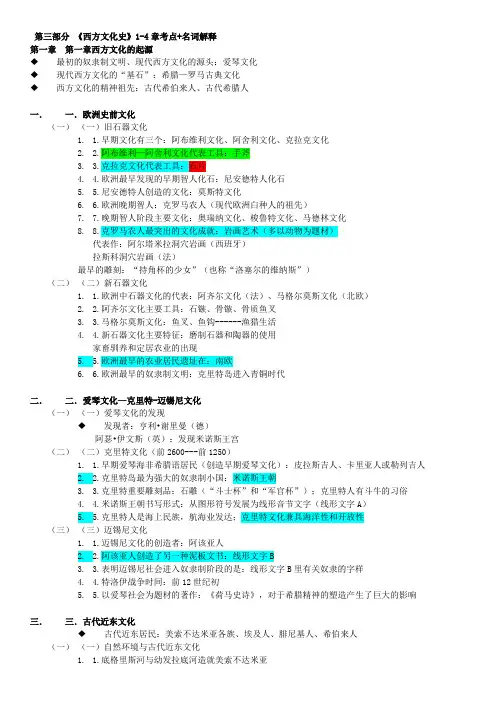
第三部分《西方文化史》1-4章考点+名词解释第一章第一章西方文化的起源◆最初的奴隶制文明、现代西方文化的源头:爱琴文化◆现代西方文化的“基石”:希腊—罗马古典文化◆西方文化的精神祖先:古代希伯来人、古代希腊人一.一.欧洲史前文化(一)(一)旧石器文化1. 1.早期文化有三个:阿布维利文化、阿舍利文化、克拉克文化2. 2.阿布维利—阿舍利文化代表工具:手斧3. 3.克拉克文化代表工具:石片4. 4.欧洲最早发现的早期智人化石:尼安德特人化石5. 5.尼安德特人创造的文化:莫斯特文化6. 6.欧洲晚期智人:克罗马农人(现代欧洲白种人的祖先)7.7.晚期智人阶段主要文化:奥瑞纳文化、梭鲁特文化、马德林文化8.8.克罗马农人最突出的文化成就:岩画艺术(多以动物为题材)代表作:阿尔塔米拉洞穴岩画(西班牙)拉斯科洞穴岩画(法)最早的雕刻:“持角杯的少女”(也称“洛塞尔的维纳斯”)(二)(二)新石器文化1. 1.欧洲中石器文化的代表:阿齐尔文化(法)、马格尔莫斯文化(北欧)2. 2.阿齐尔文化主要工具:石镞、骨镞、骨质鱼叉3. 3.马格尔莫斯文化:鱼叉、鱼钩------渔猎生活4. 4.新石器文化主要特征:磨制石器和陶器的使用家畜驯养和定居农业的出现5. 5.欧洲最早的农业居民遗址在:南欧6. 6.欧洲最早的奴隶制文明:克里特岛进入青铜时代二.二.爱琴文化—克里特-迈锡尼文化(一)(一)爱琴文化的发现◆发现者:亨利•谢里曼(德)阿瑟•伊文斯(英):发现米诺斯王宫(二)(二)克里特文化(前2600---前1250)1. 1.早期爱琴海非希腊语居民(创造早期爱琴文化):皮拉斯吉人、卡里亚人或勒列吉人2. 2.克里特岛最为强大的奴隶制小国:米诺斯王朝3. 3.克里特重要雕刻品:石雕(“斗士杯”和“军官杯”);克里特人有斗牛的习俗4. 4.米诺斯王朝书写形式:从图形符号发展为线形音节文字(线形文字A)5. 5.克里特人是海上民族,航海业发达;克里特文化兼具海洋性和开放性(三)(三)迈锡尼文化1. 1.迈锡尼文化的创造者:阿该亚人2. 2.阿该亚人创造了另一种泥板文书:线形文字B3. 3.表明迈锡尼社会进入奴隶制阶段的是:线形文字B里有关奴隶的字样4. 4.特洛伊战争时间:前12世纪初5. 5.以爱琴社会为题材的著作:《荷马史诗》,对于希腊精神的塑造产生了巨大的影响三.三.古代近东文化◆古代近东居民:美索不达米亚各族、埃及人、腓尼基人、希伯来人(一)(一)自然环境与古代近东文化1. 1.底格里斯河与幼发拉底河造就美索不达米亚尼罗河孕育埃及2. 2.“尼罗河的赠礼”:埃及“肥沃的新月地带”:两河流域包括巴勒斯坦3. 3.古代埃及与美索布达米亚地区都经历了由城邦走向统一的过程,形成了奴隶制神权统治,王权与法律均来自神授4. 4.埃及文化:单一发展进程5. 5.两河流域最早奴隶制文明创造者:苏美尔人6. 6.古代埃及人发明了:太阳历(二)(二)古代美索不达米亚文化(以苏美尔文化为基础,由阿卡德人、巴比伦人、亚述人等发展而来)1. 1.阿摩利人的古巴比伦王国,亚述人的亚述帝国以及迦勒底人的新巴比伦王国先后统治美索不达米亚地区2. 2.前3000年:苏美尔人开始使用楔形文字3. 3.最初的学校出现在:苏美尔4. 4.亚述学:通过楔形文字来研究两河流域历史文化5. 5.美索不达米亚最著名的史诗:《吉尔伽美什史诗》6. 6.美索不达米亚人的宗教观:多神信仰、神的人格化、灵魂不死观7.7.古巴比伦珍贵遗产:《汉谟拉比法典》(共282条),保留了原始的“同态复仇”习惯法8.8.《汉谟拉比法典》实质是:维护奴隶主阶级统治其进步意义:1)以成文法的形式使古巴比伦社会人人有法可依2)规定了明确的诉讼程序9.9.美索不达米亚建筑杰出代表:“空中花园”(世界七大奇观之一)“七级大庙塔”10.10.几何学:巴比伦人运用勾股定理11.11.代数学:巴比伦人使用十进位与六十进位制12.12.古巴比伦人制定太阴历13.13.今天历法中星期制度的来历:每周七天,即日、月、水、火、木、金、土(三)(三)古代埃及文化1. 1.象形文字的发明者:古代埃及人2. 2.使文字开始具有抽象含义的是:表意符号的出现3. 3.埃及的象形文字由三个部分构成:表形、表意、表音4. 4.字母文字的创造者:腓尼基人5. 5.埃及学诞生的标志:1882年商博良(法)释读象形文字6. 6.古代埃及人最初的宗教信仰:图腾崇拜7.7.埃及法老被视为太阳神的化身,又被称为太阳神之子,其权力来自神授8.8.法老阿蒙霍特普四世创作:《阿顿颂诗》9.9.古代埃及著名诗歌:《打谷歌》《阿顿颂诗》10.10.古代埃及最著名的箴言《伊浦味箴言》11.11.古代埃及著名建筑:金字塔、“迷宫”、底比斯的阿蒙神庙12.12.古代埃及雕塑代表:狮身人面像、涅菲尔提提王后像(阿玛尔纳艺术)13.13.数学成就:埃及人应用十进位法、求出圆周率3.1614.14.天文成就:世界上最早的太阳历(四)(四)古代近东文化对西方文化的影响1. 1.古代近东文化包括:美索不达米亚文化、埃及文化2. 2.西方文化的两大精神祖先:希腊人、希伯来人3. 3.《旧约圣经》中“通天塔”的原型:巴比伦城的七级大庙塔4. 4.古代希腊字母:由腓尼基字母发展而来,腓尼基字母(22个)是世界上第一套拼音字母;希腊字母后来发展成拉丁字母和斯拉夫字母5. 5.希腊雕像考罗斯:具有埃及人的气质6. 6.埃及的《阿顿颂诗》影响了《旧约圣经》的《诗篇》7.7.前45年,朱里亚.凯撒在埃及立法的基础上制定“朱里亚历”(“儒略历”),在罗马推行8.8.16C末,教皇格里高利十三世制定“格里高利历”(今天通行世界的“公历”)9.9.数学方面,希腊数学家欧几里德继承古代埃及几何学四.四.希伯来文化希伯来宗教伦理思想成为现代西方宗教和伦理思想的主要源泉,希伯来人是西方文化的精神始祖之一(一)(一)希伯来人与犹太教1. 1.希伯来人宗教思想的核心内容之一:“摩西十诫”2. 2.所罗门死后,希伯来人国家分裂为:以撒玛利亚为都城的以色列(北部)以耶路撒冷为都城的犹太(南部)3.著名先知以西结极大发展了犹太教,增加了救世主(弥赛亚)4.犹太人宗教与社会生活的中心:犹太会堂5.犹太教分裂出的教派:法利赛派、撒都该派、艾塞尼派6.研究古代希伯来人宗教与历史的珍贵资料:《死海古卷》7.犹太教思想成为基督教主体思想,其经典构成了基督教的《旧约圣经》8.以色列及散居各地的犹太人的名族语言:希伯来语(二)(二)《旧约圣经》(犹太教的经典)1. 1.《旧约圣经》共39卷,由法律书、先知书、圣录三部分组成2. 2.旧约的主题和核心:“法律书”,在旧约中地位最高,包括《创世纪》《出埃及记》《利未记》《名数记》《申命记》(为摩西所传,又称《摩西五经》)3. 3.“先知书”地位次于“法律书”,从希伯来人建国至新巴比伦征服犹太王国这段时间的历史记载和先知言行录4. 4.“圣录”的地位次于“先知书”,内容包括“巴比伦囚徒”至波斯统治时期的犹太历史和诗篇5. 5.《七十子希腊译本》:被翻译成希腊文的旧约,比希伯来文经典多出一部分经卷,人们把没有争议的经卷称为“正典”,有争议的称为“后典”(三)(三)希伯来人的宗教---伦理思想1. 1.犹太教宗教思想的特点:1)坚持一神论,只有雅赫维才是唯一真神2)契约观念3)注重戒律,如摩西十戒4)弥赛亚和天国观念第二章第二章西方古典文化的繁荣理性主义与人文主义,民主与科学的精神,是希腊古典文化的精髓,造就了西方文化中的古典传统。
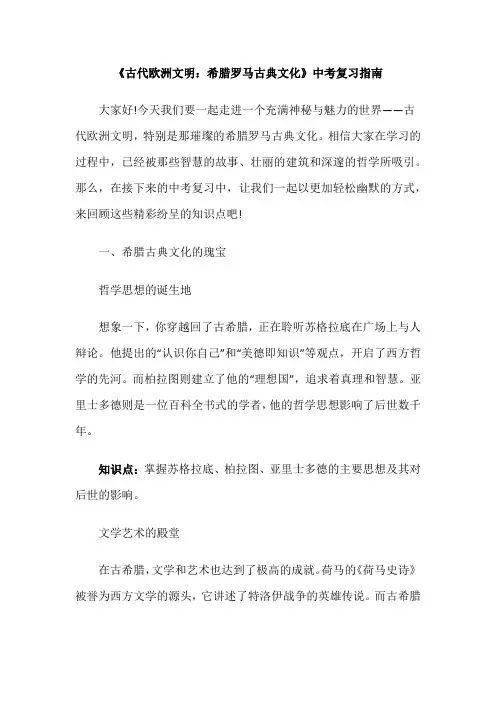
《古代欧洲文明:希腊罗马古典文化》中考复习指南大家好!今天我们要一起走进一个充满神秘与魅力的世界——古代欧洲文明,特别是那璀璨的希腊罗马古典文化。
相信大家在学习的过程中,已经被那些智慧的故事、壮丽的建筑和深邃的哲学所吸引。
那么,在接下来的中考复习中,让我们一起以更加轻松幽默的方式,来回顾这些精彩纷呈的知识点吧!一、希腊古典文化的瑰宝哲学思想的诞生地想象一下,你穿越回了古希腊,正在聆听苏格拉底在广场上与人辩论。
他提出的“认识你自己”和“美德即知识”等观点,开启了西方哲学的先河。
而柏拉图则建立了他的“理想国”,追求着真理和智慧。
亚里士多德则是一位百科全书式的学者,他的哲学思想影响了后世数千年。
知识点:掌握苏格拉底、柏拉图、亚里士多德的主要思想及其对后世的影响。
文学艺术的殿堂在古希腊,文学和艺术也达到了极高的成就。
荷马的《荷马史诗》被誉为西方文学的源头,它讲述了特洛伊战争的英雄传说。
而古希腊的戏剧更是让人叹为观止,悲剧之父埃斯库罗斯、喜剧之父阿里斯托芬等人的作品至今仍然让人津津乐道。
知识点:了解《荷马史诗》的主要内容,掌握古希腊悲剧和喜剧的代表人物及其作品。
建筑雕塑的奇观古希腊的建筑和雕塑艺术同样令人叹为观止。
帕特农神庙、雅典卫城等建筑展现了古希腊人对于美的不懈追求。
而菲迪亚斯、米隆等雕塑家的作品,则以其精湛的技艺和生动的形象,成为了世界艺术宝库中的瑰宝。
知识点:了解古希腊建筑的代表作及其特点,掌握著名雕塑家的代表作品及其艺术特色。
二、罗马古典文化的辉煌罗马法的基石罗马法是古罗马文明的重要组成部分,它为后世的法律体系奠定了坚实的基础。
从《十二铜表法》到《查士丁尼法典》,罗马法逐渐完善并影响了整个欧洲乃至世界的法律制度。
知识点:了解罗马法的发展历程及其主要特点,掌握《十二铜表法》和《查士丁尼法典》的基本内容。
宏伟的建筑风格古罗马的建筑风格以其宏伟、壮观和实用而著称。
罗马竞技场、万神庙、凯旋门等建筑都是古罗马文明的杰出代表。
欧洲文化常识高考知识点欧洲,作为一个世界文明的发源地之一,拥有丰富多彩的文化。
对于学习欧洲文化的人来说,掌握欧洲文化常识也是相当重要的一项任务。
在高考中,关于欧洲文化的知识点也是屡屡出现,下面我们就来了解一下一些常见的欧洲文化知识点。
1. 文艺复兴时期的欧洲艺术文艺复兴是欧洲历史上一个具有重大影响的时期,它不仅是一种思想观念的变革,也是艺术形式的变革。
在文艺复兴时期,欧洲艺术家们创作了大量精美绝伦的作品,其中最具代表性的就是达·芬奇的《蒙娜丽莎》和米开朗基罗的《创世纪》。
2. 希腊神话希腊神话是欧洲文化中非常重要的一部分。
在高考中,经常会涉及到希腊神话中的一些英雄人物,比如赫拉克勒斯、俄狄浦斯等。
了解希腊神话不仅可以帮助我们理解欧洲文学作品中的许多隐喻和象征,还能对我们的思维方式产生一定的影响。
3. 欧洲音乐史欧洲有着世界上最发达的音乐文化传统之一。
在欧洲音乐史中,有许多伟大的作曲家和音乐家,比如巴赫、贝多芬、莫扎特等。
了解欧洲音乐史的发展,可以增加我们对音乐的欣赏和理解。
4. 文学经典欧洲文学经典是欧洲文化的瑰宝。
在高考中,常常会出现一些欧洲文学作品的选段或者相关问题。
大家需要熟悉并理解这些文学经典,比如莎士比亚的《哈姆雷特》、居里夫人的《悲惨世界》等。
5. 欧洲人文思想欧洲亦以其深厚的人文思想而著称于世。
例如,启蒙运动、浪漫主义和现实主义等思潮在欧洲文化中起到了重要的作用。
了解这些人文思想的发展过程和理念,可以拓宽我们的思维视野。
6. 欧洲建筑欧洲建筑是世界建筑史上的瑰宝。
从古希腊的神庙、古罗马的竞技场,到中世纪的哥特式教堂,再到现代的现代主义建筑,欧洲建筑风格各异,各具特色。
了解欧洲建筑的特点和发展,可以培养我们的审美能力。
7. 欧洲传统节日欧洲有许多独特而有趣的传统节日,比如圣诞节、复活节等。
这些节日不仅是欧洲人民重要的文化传统,也是欧洲人们与这个世界交流互动的途径。
了解欧洲传统节日的背后的文化内涵,可以增进我们对跨文化交流的理解和认识。
欧洲文化导论知识点总结欧洲文化源远流长,涵盖的范围极广。
它融合了各种各样的文化元素,包括古希腊罗马文明、基督教文化、文艺复兴时期的人文主义思想等。
欧洲文化的丰富多样性使得其成为了一个世界文化中心,对世界其他地区的文化传统和发展起到了深远的影响。
在欧洲文化导论的学习中,我们将探索欧洲文化的方方面面,包括历史、宗教、哲学、文学、艺术等多个领域。
以下是一些欧洲文化导论的知识点总结:1. 古希腊文化古希腊文化是欧洲文明的发源地之一。
古希腊人的思想和艺术成就影响了后世的发展。
古希腊的哲学家,如苏格拉底、柏拉图、亚里士多德等,奠定了西方哲学的基础。
古希腊的文学作品,如荷马史诗、悲剧和喜剧等,对后世文学产生了深远的影响。
此外,古希腊的建筑、雕塑、绘画等艺术形式也对后来的艺术产生了重要影响。
2. 古罗马文化古罗马文化是欧洲文明的另一个重要组成部分。
罗马法、公共工程、宗教、政治制度等对欧洲的发展产生了深远的影响。
古罗马的建筑、雕塑、绘画等艺术形式也对后世的艺术产生了重要影响。
古罗马的文学作品和历史著作也被后世的作家和历史学家所推崇。
3. 基督教文化基督教是欧洲文化的重要组成部分。
基督教的价值观和信仰对欧洲的历史、文化和艺术产生了深远的影响。
基督教的教义和圣经故事成为了欧洲文学、绘画、音乐等艺术形式的主题,对欧洲文化的发展产生了深远的影响。
4. 文艺复兴文艺复兴是欧洲文化史上的一个重要时期。
文艺复兴时期的人文主义思想推动了欧洲文化、哲学和艺术的发展。
文艺复兴时期的艺术家、学者和思想家产生了大量具有深远影响的作品。
5. 宗教改革宗教改革是欧洲文化史上的另一个重要时期。
宗教改革对基督教教会和欧洲社会产生了深远的影响,也成为了欧洲文化变革的导火索。
6. 欧洲的殖民扩张欧洲的殖民扩张对世界的历史、政治、经济和文化产生了深远的影响。
欧洲的殖民扩张也是欧洲文化与其他地区文化相互交流的重要渠道。
7. 欧洲的政治和社会制度欧洲的政治和社会制度对欧洲文化的发展产生了重要影响。
徐建忠欧洲文化知识点梳理1.古希腊文化:古希腊文化对欧洲文化产生了重要的影响。
希腊是古代文明的发源地之一,其哲学、艺术、科学成就为世界文化史做出了巨大贡献。
希腊文化的代表人物有苏格拉底、柏拉图、亚里士多德等。
2.古罗马文化:古罗马文化也是欧洲文化的重要组成部分。
罗马帝国的法律体系、建筑风格、政治制度等都对后世产生了深远的影响。
古罗马文化的代表人物有凯撒大帝、君士坦丁大帝、荷马等。
3.基督教文化:基督教是欧洲最重要的宗教之一,基督教文化深深影响了欧洲的价值观和生活方式。
欧洲有许多世界著名的教堂和修道院,如梵蒂冈、巴黎圣母院等都是基督教文化的重要象征。
4.文艺复兴:文艺复兴是欧洲文化史上一次伟大的文化运动。
它在15世纪至16世纪期间兴起于意大利,并逐渐传播到整个欧洲。
文艺复兴时期的艺术家们追求人性的完美与自由,充分发扬了个人的创造力和思想。
莱昂纳多·达·芬奇、米开朗基罗等是文艺复兴时期的代表人物。
5.巴洛克艺术:巴洛克艺术是17世纪至18世纪欧洲的一种艺术风格。
巴洛克建筑以华丽的装饰和复杂的结构而著称,其代表性建筑有法国凡尔赛宫和意大利圣伯多禄大殿。
巴洛克音乐和绘画也具有独特的风格。
6.现代主义运动:20世纪初期的现代主义运动对欧洲文化带来了全面的冲击。
现代主义运动主张拒绝传统,追求新的艺术形式和思维方式。
该运动的代表人物有皮埃尔·楚拉、毕加索、荣格等。
7.民族音乐:欧洲有着丰富多样的民族音乐。
例如,爱尔兰的民间音乐以其琴弦乐器和节奏鲜明的音乐风格而著称。
俄罗斯的民族音乐以其浓厚的民间特色和美丽的旋律而闻名。
8.电影:欧洲是世界电影的重要发源地之一,法国、意大利、德国等国家的电影工业非常发达。
法国的新浪潮运动、意大利的新现实主义运动等影响了世界的电影发展。
9.美食:欧洲各国都有独特的美食文化。
法国的美食以其高雅的烹饪方式和丰富的菜肴而闻名。
意大利的披萨、意面等传统美食也享誉全球。
《欧洲文学史》期末复习重点1、“两希”文学传统(名词解释):“两希”文学传统是指古希腊文学传统和希伯莱——基督教文学传统;古希腊文学强调人的原欲和敏感的文学传统:《荷马史诗》,古希腊神话与古希腊戏剧(悲、喜);希伯莱——基督教文学是重灵魂、群体、来世的理性文学传统:《圣经》。
2、古希腊神话:理解“神,人同形同性”古希腊神话属于古希腊文学的一个类型,古希腊文学体现人与命运的抗争,与自我现实的实现。
因此,古希腊神话是从以人为中心的神话,所以人按照自己的形象特征去塑造神,至此就形成了“神,人同形同性”。
3、《荷马史诗》(名词解释):该书创作于公元前8世纪左右,相传是由名叫荷马的诗人根据真正的战争历史整理而成的,分为两个部分,《伊利昂纪》和《奥德修纪》合起来称为《荷马史诗》。
《荷马史诗》的内容包括两个:《伊利昂纪》写的是公元前12世纪希腊人围攻特洛伊城的故事;《奥德修纪》写的是希腊英雄奥德修斯在特洛伊战争结束后还乡的故事。
4、、《荷马史诗》中个体意识的体现(或是内涵)①英雄形象的个性化。
在《荷马史诗》中,英雄不是理想化的,不近人情的形象,相反他们的英雄内涵恰恰是她们把人身上特有的情感与才智发挥到了极限,是作为一个富有个性的人而成为英雄的。
比如:“阿基琉斯的愤怒”,这愤怒中凸显的是人的个体意识。
如,阿基琉斯在战场上的英勇善战、奋不顾身而又暴烈鲁莽;而英勇、智慧的奥德修斯善用计谋,甚至十分狡诈的特点,这都体现着英雄形象的个体意识。
奥德修斯为维护个人的财产、权利、荣誉而进行的斗争,体现了个人意识的觉醒。
②神的形象的凡人性:在《荷马史诗》中,诸神各各具有自己的特点,具有凡人所具有优点和缺点。
如,爱神阿弗洛狄忒曾以横蛮的态度对待海伦;不死的女神阿基琉斯的母亲看着儿子将要走上不归之路时的难过和不舍;智慧女神雅典娜与俄底修斯友好的交往等都体现了神的凡人性。
③《荷马史诗》的悲剧内涵:A、人在命运的阴影中遭受的困难。
在《荷马史诗》中,凡人的人生是短暂而充满苦难的,人一出生即注定受苦,连宙斯也无法改变。
第二单元古代欧洲文明【知识记背】一、希腊城邦1、位置:其地理环境呈现出:环海、多山、多岛屿的特点,平原面积很小,耕地十分有限。
利弊:一方面多山各地不便于联系,影响了希腊的统一;耕地十分有限,不利于农业发展;另一方面,适于航海和海外贸易的发展。
2、古希腊城邦(1)出现:公元前8世纪开始,希腊出现城邦国家;特点:“小国寡民”;最大的城邦斯巴达。
最典型的城邦是雅典。
(2)城邦居民:①分类:希腊城邦居民分为公民和非公民;②公民与非公民:成年男性公民有参与统治的权力。
(广大妇女、儿童、外邦人及奴隶无公民权)非公民:非公民包括外邦人和奴隶;外邦人是自由人;但他们没有政治权利,不能占有土地。
奴隶几乎没有任何权利和自由。
关系:公民与非公民是统治与被统治的关系。
二、雅典的民主政治1、公元前5世纪中后期伯里克利主政时期,雅典达到全盛,奴隶制民主政治也随之发展到高峰。
2、雅典最高权力机构是公民大会;雅典城邦的日常事务由代表各地的10个主席团轮流主持;城邦的公职人员和主席是抽签产生;为确保贫穷公民参政议政,伯里克利建立了津贴制度。
3、特点:主权在民;轮番而治;权力制约;直接民主4、评价:①为雅典经济和文化的繁荣提供了政治上的条件,把古代世界的民主政治发展到高峰;②局限性:仅适用于成年男性公民;占雅典人口绝大多数的外邦人、奴隶、妇女没有任何政治权利。
它本质上仍是少数奴隶主对广大奴隶的专政;容易使民主成为个人争夺权力的工具,甚至成为一种暴民政治。
三、亚历山大帝国1、亚历山大东征:开始时间:公元前334年;经过:马其顿国王亚历山大击败波斯大军(国王大流士妻、女被俘)——攻占地中海东岸——进入埃及(前332年)——灭波斯(公元前330年);结果:建立起地跨欧、亚、非三洲的亚历山大帝国。
2、评价:有人说:“亚历山大东征是一次侵略战争,没有任何积极意义。
”对此,你如何看待?这种看法是错误的。
亚历山大东征具有侵略性质,给东方人民带来巨大灾难,掠夺了东方世界的无数财富。
Greek Culture:Two Major Elements of European Culture☐The Greco-Roman ElementParthenon:the chief temple of the goddess Athena( the goddess of wisdom, arts and warfare) built on the acropolis at AthensShe-wolf: Romulus & Remusthe Colosseum: gladiator☐The Judeo-Christian ElementmenorahGreek Culture☐Historical Context☐Social and Political Structure☐Literature☐Philosophy☐Lasting EffectHistorical Context:Trojan War (1,200 B.C.)The Trojan War broke out at the end of the Mycenaean Civilization. All the city-states in Mycenae sent troops to help form a coalition army for the battles. Not long after the war, the Dorians from the northwest of Greece invaded and destroyed Mycenae in about the 12th–11th centuries BC.The war originated from a quarrel between the goddesses Athena, Hera, and Aphrodite, after Eris, the goddess of strife and discord, gave them a golden apple, sometimes known as the Apple of Discord,marked ―for the fairest‖. Zeus sent the goddesses to Paris, who judged that Aphrodite, as ―the fairest‖, should receive the apple. In exchange, Aphrodite made Helen, the most beautiful of all women and wife of Menelaus, fall in love with Paris, who took her to Troy. Agamemnon, the king of Mycenae and the brother of Helen’s husband Menelaus, waged a war against Troy.☐Direct Fuse: the stolen wife☐Root Cause: ambition to conquer the worldLeaders on Both SidesThe Trojan: Priam, Hector, ParisThe Greek: Menelaus, Agamemnon, Odysseus, Achilles, Patroclus, AjaxConsequences of the War☐Burning of TroyEstablishment of Rome: Virgil: AeneidGreek mythology:Mount Olympus:the ―home of the gods‖. The deities who dwelled on this mountain were ruled by Zeus, included his wife, his brothers, his sisters and his children.The Olympian GodsZeus(宙斯): the heavenly king of the gods and ruler of mankindPoseidon(波塞冬): the moody god of the seasHades(哈得斯): the gloomy god of the underworldHestia (赫斯提): the calm goddess of the hearthHera(赫拉): the mature goddess of the family; sister & wife of ZeusAres(阿瑞斯): the fierce god of the warAthena(雅典娜): the sophisticated goddess of wisdom and artsApollo(阿波罗): the youthful god of the sun and the musicAphrodite(阿芙罗狄蒂): the sensual goddess of love and beautyHermes(赫尔墨斯): the cunning god of the tradeArtemis (阿耳特弥斯): the wild goddess of the huntHephaestus (赫菲斯托斯): the ill-favored god of metallurgyProsperity of Greek Culture (5th century B.C.)☐Repulse of the Persian Invasion: the pass of Thermopylae (480 B.C.)☐The establishment of democracy☐The flourisng of science, philosophy, literature, art and historical writing in AthensThe Persian InvasionSpartans: Leonidas, the KingPersian: Xerxes☐Stranger; take word to Sparta:here we lie, obeying her orders.-------- Herodotus, Father of HistoryAlexander, King of Macedon(4th century B. C.)☐Unification of all Greece☐Conquest of Europe, Asia and AfricaWide spread of Greek Culture: Egypt: AlexandriaSocial & Political Structure☐polis (city-state)☐Democracy: ―exercise of power by the whole people‖ (adult male citizens) Slave labour: harsh exploitationOlympic Games: ―Citius-Altius-Fortius‖Greek Literature☐Epics☐Lyrics☐Drama☐Allegories: AesopHomer:Iliad: the war of TroyOdyssey: the return of Odysseus to his home: IthacaLyric PoetryLyrics: poetry that expresses direct personal feelingsPindar:odes: expression of noble feelings, often in celebration of special events Sappho (Lesbos):In gold sandalsdawn like a thieffell upon me.Drama (5th Century. B.C.)TragedyAeschylus: Prometheus Bound, Persians, AgamemnonSophocles: Oedipus the King, Electra, AntigoneEuripides:Andromache, Medea, Trojan WomenComedyAristophanes: Frogs, Clouds, Wasps, Birds“As for comic Aristophanes,The dog too witty and too profane is.”------Jonathan SwiftPhilosophy & Science☐The spirit of free enquiry☐Ready to drop established ideas☐To speculate, to use their imagination and to form their own conclusionsMinor Scientists & Thinkers☐Pythagoras:founder of scientific mathematics; point, line, bodythe first theory of propotion; Everything is numbers.☐Heracleitue/Heraclitusfire: primary element of the universe―all is flux, nothing is stationary‖―You cannot step twice into the s ame river; for fresh waters are ever flowing in upon you. The sun is new everyday.‖☐Democritus:the atomic structure of matter; the earliest exponent of the atomic theory:Material world is composed of tiny, inseparable particles called atoms.―It is right, since we are human, that we should not laugh at human misfortunes but lament them‖☐Euclidestablished the science of plane geometry; Elements: a textbook of geometry☐ArchimedesThe principle of the lever ―Give me a place to stand, and I will move the world‖PhilosophySocrates (about 470-399 B.C.)☐Dialogues☐one of the founders of Western philosophy☐The dialectical method☐―The Apology of Socrates‖―The hour of departure has arrived, and we go our ways—I to die, and you to live. Which is better God only knows.‖Plato (about 428-348 B.C.)☐Dialogues―Plato was essentially a poet—the truth and splendor of his imagery, and the melody of his language, are the most intense that it is possible to conceive‖—— Shelley☐Republic : the ideal state ruled by a philosopher but barring poets☐Idealism: only ―ideas‖ are completely real; the physical world is relatively real.☐The AcademyAristotle (384-322 B.C.)☐Tutor of Alexander―the master of those who know‖ —Dante☐Ethics, Politics, Poetics, Rhetoric☐Materialism:direct observation of nature; theory should follow facts.Greek Culture: Two WarsGreek Civilization came to its peak during Pericles’ reign and then began to decline, during which two wars broke out with profound meanings.One is the war between Greek city-states and Persian invaders (499 BC–449 BC). The victory laid the foundation for the development and prosperity of Greece.However, peace and stability did not last long after the victory because a split occurred between the two strongest city-states (459 BC–404 BC) , thus leading to the decline of Athens and most poleis involved in the war. Till 146 BC, the regions of Greek Peninsula and Aegean Sea islands were allseized and conquered by Roman troops and merged into the map of Roman Empire.Pericles:Athenian statesman whose leadership contributed to Athen's political and cultural supremacy in Greece; he ordered the construction of the Parthenon (died in 429 BC).Sophists☐Teachers of the art of arguing☐Protagoras: “Man is the measure of all things.”Contending Schools of Thought (4th Century, B.C.)☐The Cynics: Diogenesself-sufficiency & extreme simplicity in life; no patience with the rich and powerful☐The Sceptics: Pyrrhonnot all knowledge was attainabledoubt the truth of what others accepted as true☐The Epicureans: Epicuruspleasure: the highest good in life;freedom from pain and emotional upheavalthe practice of virtueMisunderstanding: indulgence in luxurious living☐The Stoics: Zenothe most important thing in life: dutyendure hardship and misfortune with courageChinese PhilosophersSpring & Autumn Period (770-476 B. C.)☐Lao Tzu (604-531 B. C.):Tao Te Tsing☐Confucius (551-479 B. C.):The AnalectsWarring States (475-221 B. C.)Historical WritingsGreek history has contributed considerably to the constitution of Greek and Western civilization with its abundant documents of a variety of historical events and figures scattered in social, political, military and cultural fields. The most famous historians are Herodotus(485 BC–425 BC) and Thucydides(about 460 BC–404 BC).●Herodotus is generally acknowledged as the first reputed historian of Greece.●―Father of History‖●His writing Histories objectively describes the war between Persians and Greece.●―that the great and wonderful deeds done by Greeks and Persians should not lack renown.‖●Thucydides is generally acknowledged as one of the greatest of ancient Greece for histruthfulness, conciseness and imagination.●―the greatest historian that ever lived.‖ (Macaulay: English Historian)●His History of the Peloponnesian War recounts the struggle between Athens and Sparta in the5th century BC, as the first recorded political and moral analysis of a nation’s war policies. Architecture☐Temples: Parthenon☐The Doric style; The Ionic style; The Corinthian styleThe Doric style☐masculine style:☐sturdy, powerful, severelooking; monotous☐showing a good sense of proportionThe Ionic style☐feminine style☐graceful and elegant; a wealth of ornamentThe Corinthian style☐ornamental luxurySculpture☐the earliest: Gods: stiff, lifeless☐5 th C. B.C.: the beauty of the internal structure of human bodies and mythological figuresVenus de Milo(Aphrodite of Milos):symbol of beauty&grace; a personification of vitality and dignity Discus Thrower:relaxation and contraction of the muscleLaocoon Group: facial expression: fear, sympathyPottery☐Domestic needs & foreign trade☐Jars and other utesnsils☐The varying shapes and beautiful figures painted on them reflected the high degree of Greek civilization.black-figure paintings:☐Paintings on pottery that have red background and black figurered-figure paintings:☐Paintings on pottery that have black background and red figureLasting Effect☐To understand the world by the use of human reason☐Greece is every Western man’s second nature.☐Influence on LiteratureByron: Isles of Greece Shelley: Hellas & Prometheus UnboundKeats: Ode on a Grecian Urn James Joyce: UlyssesThe influence on Western civilizationGreek culture is often termed the cradle of the Western civilization and has had an enormous impact on Western culture. The specific contributions are found in the areas of philosophy, politics, literature, art, science and architecture.Greek politics was one of the greatest influences on the Western civilization. The Greeks were the first to successfully create a government based on the consensus of the people and thus provided a foundation for Western democracy.The second significant influence was that of philosophy. The Socratic idea about ethics and knowledge helped the Westerners care more for the effect of knowledge and value of morality, both of which give sound guidance to people in the later years to improve and change the world outside themselves, i.e., human society and the natural world.Later generations of Westerners have benefited a lot from Greek culture, such as those in painting, sculpture, architecture, drama, poetry and historical works. Classicism had Greek culture as one of the crucial sources, and this has helped Westerners so much that they ascribed the origin of the Renaissance to it. This changed the intellectual conditions of the later medieval period and opened the way to the modern era in the West.。